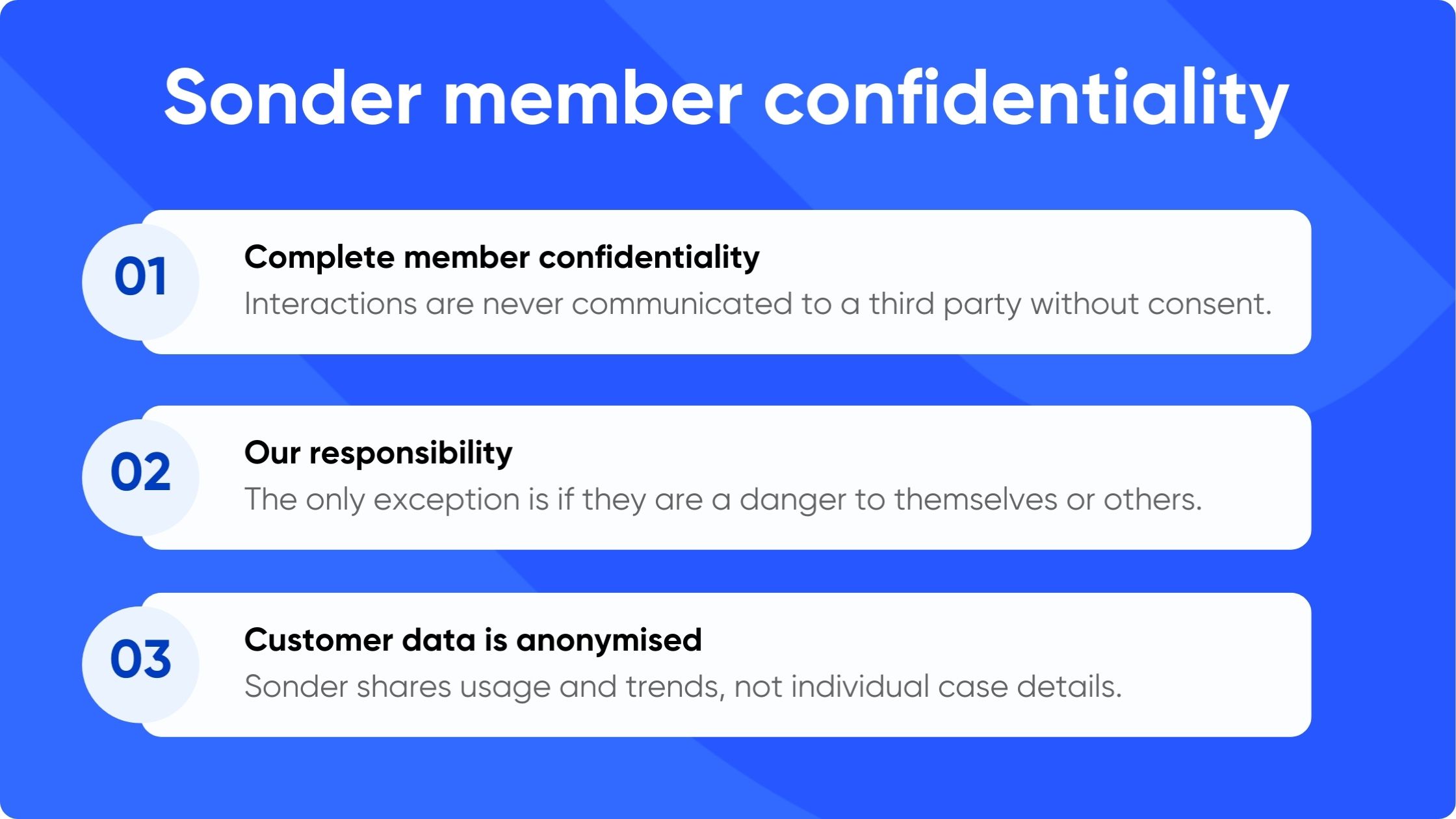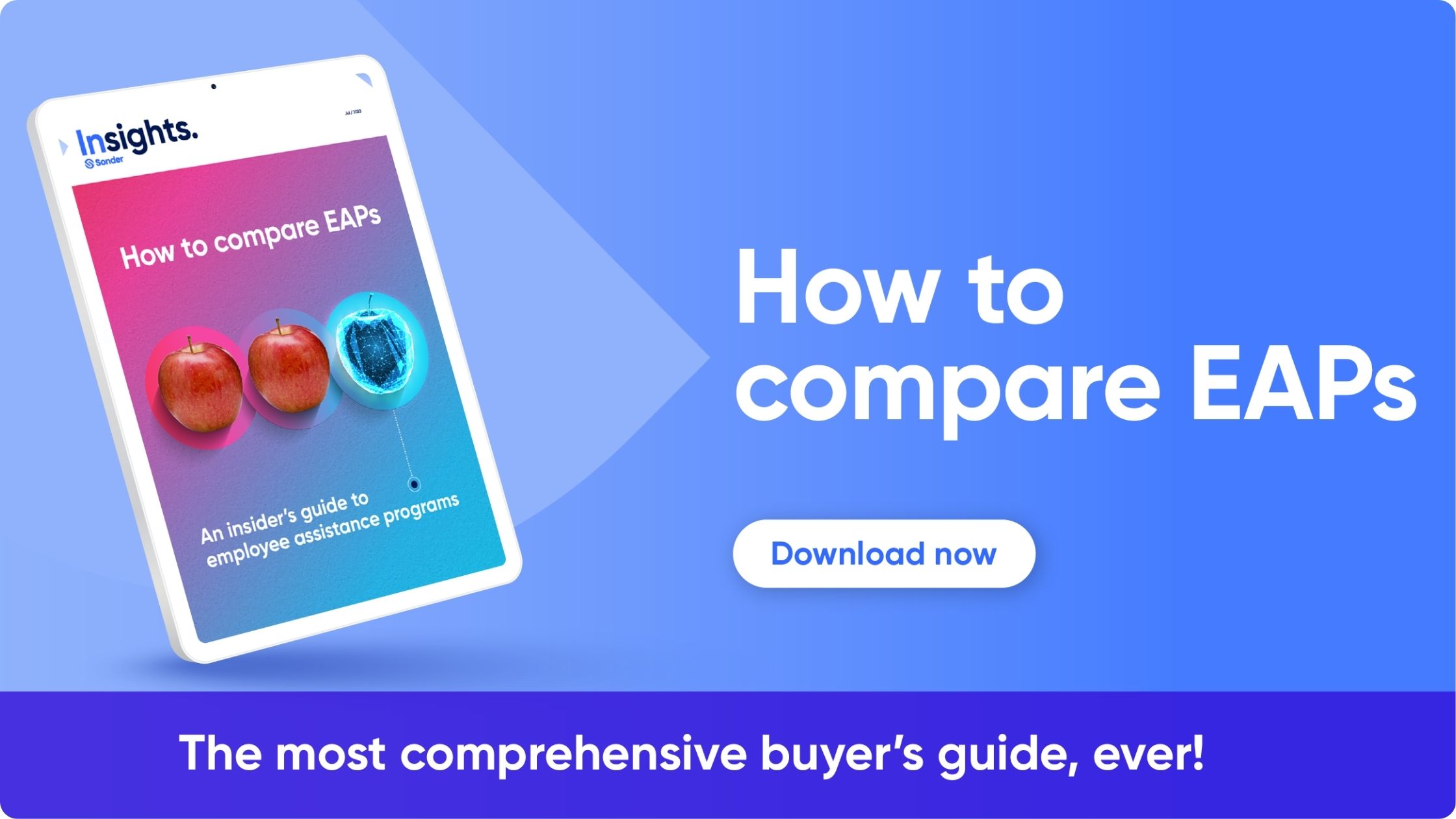The TL;DR:
- EAP counselling provides crucial support for employees dealing with personal and work-related challenges, though its effectiveness may vary.
- Challenges such as potential underutilisation and the short-term nature of support can affect the overall impact of EAP counselling on workplace wellbeing.
- Forward-thinking businesses are now looking for more holistic employee wellbeing support, that extends beyond EAP counselling.
Recognising that employees may face personal and work-related challenges, many workplaces provide Employee Assistance Program (EAP) counselling to support their employees. Providing critical support to employees, the service aims to enhance workplace wellbeing and productivity. In this blog, we’ll cover the typical inclusions, benefits and considerations employers should consider.
What is EAP counselling?
Unlike traditional therapy, EAP counselling typically focuses on short-term, solution-oriented strategies. It addresses concerns that might affect an employee’s job performance and overall wellbeing. However, the scope and depth of support can differ, with some programmes offering comprehensive assistance and others providing more basic support.
Typically, EAP counselling includes:
- Tailored workplace focus: The service is developed with the workplace setting in mind, aiming to address professional and personal issues.
- Range of support: EAPs may cover various challenges, including but not limited to mental health, family matters, and substance abuse.
- Family involvement: Some EAPs extend services to employees’ immediate family members, acknowledging the interconnectedness of employee wellbeing.
- Solution-focused approach: Counselling usually provides short-term support, aiming to offer immediate solutions rather than long-term therapy.
Our guide about EAPs offers a detailed perspective for those interested in exploring the concept further. This guide provides insights and compares different models of EAPs, allowing organisations to make informed decisions based on their unique needs.

Benefits and limitations of EAP counselling for the workplace
EAP counselling can contribute to overall workplace wellbeing by enhancing mental health and addressing personal issues that affect work performance. This fosters a supportive culture and enhances workforce resilience, creating a healthier, more positive work environment. Further potential benefits of EAP counselling include:
- Improves employee mental health and psychological resilience.
- Addresses substance abuse, family conflicts, and work-related stress.
- Boosts employee productivity and morale.
- Demonstrates a commitment to employee welfare, fostering a supportive culture.
While there are numerous benefits, there are also limitations to consider:
- EAP counselling might not address long-term mental health issues due to its short-term nature.
- Employees may under utilise the services due to a lack of awareness or stigma.
- Program effectiveness can vary depending on the provider and the employee’s needs.
For a comprehensive understanding, explore our article on the benefits of EAPs, which provides detailed insights into how EAPs contribute to and challenge workplace environments.
Is EAP counselling enough?
Modern solutions like those provided by platforms like Sonder are revolutionising EAP counselling. Sonder acknowledges the complex nature of employee challenges by offering a holistic support approach beyond traditional counselling to include medical advice and safety support.
In a sample of 10,000+ active member cases at Sonder, more people reached out for medical support than for either mental health counselling or safety support.
Recognising that issues employees face extend beyond just mental health, and are often interconnected, Sonder provides a more integrated support system designed to address the multifaceted nature of personal and professional wellbeing. This modern approach ensures that employees receive comprehensive care tailored to their unique needs and situations, promoting a healthier, more balanced work-life environment.
“Historically EAPs have focused primarily on mental health and counselling. But now, leaders are starting to explore fresh approaches that offer employee assistance that goes beyond just mental health.”
Leanne Naber
Senior Account Executive, Sonder
For a deeper understanding of how EAP counselling adapts from managing critical incidents to providing regular support and the shift towards more holistic platforms, visit our article on understanding EAP counselling.

What qualifications should an EAP counsellor have?
Some professionals have protected job titles that require qualification checks. By law, this means that to use their job title they must fulfil certain criteria (education, qualifications, and/or experience) and be registered by their relevant government authority or professions council.
Examples of professionals with protected job titles include:
- Psychologist: A person who has been assessed as having completed the necessary (usually postgraduate) education, experience, and supervision to be registered by their government registration authority or professions council (e.g. Ahpra, NZ Psychologists Board, HCPC).
- Registered nurse: A person who is suitably trained, qualified, and registered by their government registration authority (e.g. Ahpra, NCNZ, NMC).
- Medical practitioner: A person who has completed a bachelor’s degree in medicine or surgery but is required to be supervised by a specialist medical practitioner.
- Specialist medical practitioner: A person who has completed specialist postgraduate (fellowship) medical training that is recognised by their national medical board.
Other professionals have non-protected job titles and require no official qualification checks. This means that whilst they may voluntarily join an industry association to stay abreast of best practices, their qualifications, skills, and experience can vary considerably.
Examples of professionals with non-protected job titles include:
- Counsellor: A person who typically has completed study to diploma or bachelor’s degree level, and may or may not be a member of an industry association or standards authority (e.g. ACA, PACFA, NZAC, Professional Standards Authority).
- Therapist: A person who typically has a bachelor’s degree or postgraduate qualification in counselling, psychology, or social work. They may have completed specialised training and supervision with a dedicated training provider.
- Social worker: A person who typically has completed study to at least a bachelor’s degree level in social work.
The importance of confidentiality in EAP counselling
Confidentiality is central to the effectiveness of EAP counselling. Employees must feel safe to discuss sensitive matters without fear of reprisal or judgement. EAP services ensure that all conversations between the employee and the counsellor remain private, fostering a trustful environment where employees are encouraged to seek the support they need.
Key aspects of EAP counselling confidentiality include:
- Ensuring privacy to build trust.
- Encouraging open communication for adequate support.
- Adhering to strict HR confidentiality protocols.
For a more detailed discussion on the principles of confidentiality in EAP counselling, visit Sonder’s explanation on EAP confidentiality.

Should EAP counselling happen face-to-face?
According to the research, when it comes to treating anxiety and related conditions, interventions delivered by telehealth appear to be as effective as the same therapy delivered in-person.
Telehealth is also recognised as solving many of the challenges that might stop employees seeking help including time away from the workplace, arranging childcare, and restrictive hours of consultation. This is particularly relevant for those living in rural and remote areas.
Innovative approaches: Integrating face-to-face and digital EAP services
Modern alternatives, like Sonder, blend traditional face-to-face counselling with digital services. This integration caters to the diverse needs and preferences of the workforce, ensuring everyone has access to the support they need, exactly when they need it.
Key innovations in modern alternatives to EAPs include:
- Hybrid counselling options: Combining in-person sessions with digital platforms like live chat and online content, offering a versatile approach to mental health support.
- 24/7 accessibility: Ensuring employees can reach out for assistance anytime, not just during office hours, addressing issues as they arise.
The benefits of integrating digital services into EAPs extend beyond convenience, as detailed in our article on exploring the traditional benefits of Employee Assistance Programs. They provide a holistic platform beyond standard EAP capabilities, offering comprehensive support that includes medical advice, safety support, and mental health care, all accessible from one place.
Incorporating self-help digital tools, as discussed in our article about EAP self-help wellbeing apps, represents a significant shift towards empowering employees to manage their wellbeing. These tools must serve as part of a broader, integrated care approach to offer an accessible and low-effort pathway to support, ensuring we avoid the pitfalls of isolated digital solutions.
The way forward with EAPs and their alternatives
Want to learn more? Dive deeper into the world of EAP alternatives and discover how they can transform your organisation with our ultimate EAP buyer’s guide.
- Learn how to compare vendor offerings
- Discover what makes EAP alternatives different
- Gain insider tips and statistics
- Write a convincing business case

Want to learn more?
Ready to experience a modern approach to employee care? Contact Sonder today to discover how our platform can benefit your organisation.



